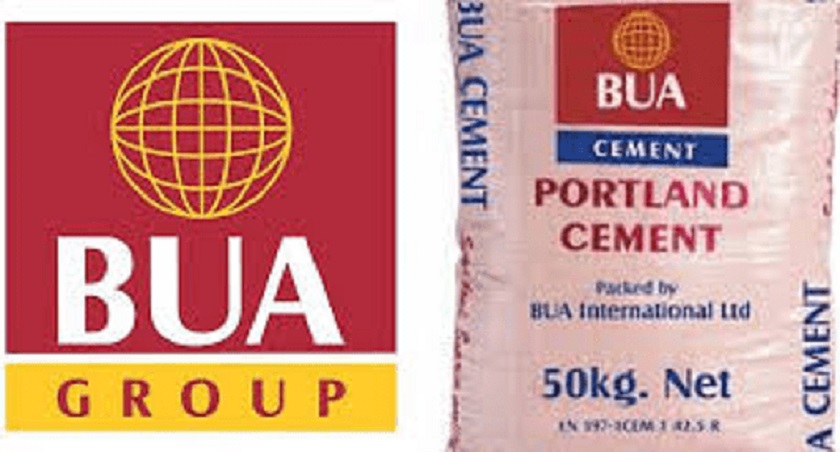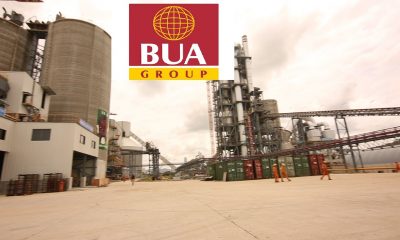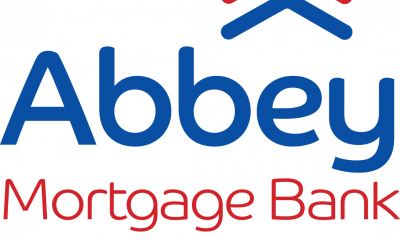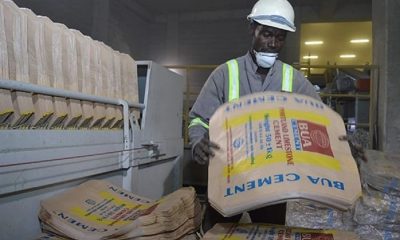Economy
Anger as BUA Betrays Customers, Increases Price of Cement

By Modupe Gbadeyanka
Customers and distributors of BUA Cement Plc have expressed their anger over what they described as a betrayal of trust on the part of the cement maker.
Their anger was triggered after the management of BUA Cement reportedly unveiled the new ex-factory price of its cement product over the weekend.
The firm increased the price of the product by N200 per bag, pushing the value higher to N3,000 per bag from N2,800 per bag despite weeks of promise not to increase the price.
Recall that a few months ago, when it was reported that the company was planning to increase the price of cement, BUA had claimed that there was no justification to increase the price of cement as it is currently making enough returns.
BUA Cement, in various statements issued between April and June this year, had refuted any claims of an increase in the ex-factory price of its cement products by N300 per bag, stating that, “the company had no plans to increase prices of its cement now or in the near future.”
According to a statement issued on April 24, 2021, the company stated that, “the solution was not in an increase of ex-factory price at this period.”
The company, in its statement, had “reiterated its stand that the timing was not right for any increase in the price of major commodities, especially not at this period whilst Nigerians are still trying to recover from the economic consequences brought about by the COVID-19 pandemic – especially for a product for which all raw materials are locally sourced.”
On June 17, 2021, BUA Cement had issued a fresh statement titled ‘No Further Increase in the Price of BUA Cement’ in response to numerous clarification requests from its distributors and the public that the company does not seek to increase the ex-factory price of its cement in the foreseeable future.
“We are aware of the feedback and outcry from the public, and the government on the high retail price of cement in a period of economic recovery.
“BUA is also of the firm belief that the current retail prices of cement are higher than normal, hence our earlier communication not to increase ex-factory prices in the foreseeable future.
“As a responsible corporate entity, we refuse and reject associations with any actions that are deemed capable of projecting any industry we operate as a cartel. Hence, whilst we respect that the said company has decided to increase their prices, we are not questioning the reason(s) why, but would like to make clear BUA’s position on a price increase.
“The timing is not right for any increase on BUA’s part, and we do not have any justifiable business reason to increase our prices (ex-factory) anytime soon. We, therefore, urge our distributors not to panic as well as not engage in any arbitrary hike in the retail price of BUA Cement,” the statement read.
But the increase in the company’s ex-factory price of cement over the weekend is generating ripples among distributors, retailers and consumers across the country, with many wondering at the sudden change of mind of the manufacturer and this volte-face dishonesty.
In a market survey carried out on the price increase, a cement distributor in Kano, Mr Sadiq, wondered why BUA Cement changed its cement price, contrary to expectations and its promise.
“I don’t understand why BUA did this increase at this particular time. The chairman of BUA, Abdulsamad Rabiu, personally promised us that his company will not increase the price of its cement.
“Honestly, this is not good for our business and the industry. This is the biggest scam by any major corporate organisation in the history of this country,” he lamented.
Another cement distributor based in Asaba, Delta State, Mr Sunday Odogwu, expressed anger at the price increase by BUA Cement, despite all his repeated promises of no further increase in the price of BUA cement.
According to Mr Odogwu, “BUA told us several times before in their statements to distributors that they are not ready to increase their cement price.
“The last notice was just last month in June. Why are they doing this now? It is so not fair, and we are disappointed. Our customers will not understand all this and will be blaming us!”
“This shows total disregard and non-adherence to international corporate governance rules and standards. More importantly, his action shows a total disregard and disrespect for his customers, who over the years from their loyalty and patronage of his cement have in no small measure contributed to his business success.
“Initially, we believed the management of BUA as having sympathy for the populace. But this current position is not only deceptive but also portrays the organisation as having a hidden agenda in order to smear competition and gain an unfair market advantage over others in the industry,” he added.
Economy
Nigeria to Export New Crude Grade Cawthorne in March

By Adedapo Adesanya
The Nigerian National Petroleum Company (NNPC) Limited is set to commence export of a new light, sweet crude grade known as Cawthorne from March 2026.
According to a report by Reuters, an NNPC spokesperson confirmed the development, describing it as part of efforts to increase output and consolidate Nigeria’s recent recovery in crude oil production.
The move aligns with Nigeria’s broader strategy to boost production after years of constraints caused by pipeline vandalism, crude theft, and unrest in oil-producing regions.
This follows the launch of two other new grades, Obodo in 2025 and Utapate in 2024, Nigeria, whic,h as Africa’s top oil exporter, seeks to strengthen its standing within the Organisation of the Petroleum Exporting Countries and its allies (OPEC+)
Cawthorne crude is scheduled for export in the third week of March and has an API gravity of 36.4, making it similar in quality to Nigeria’s Bonny Light, which is prized for high petrol and diesel yields.
According to Reuters, citing a trading source, the state oil national company issued a tender last week for cargo loading between March 24 and 25.
Analysts at Kpler noted that the new grade is expected to be exported via the Floating Storage and Offloading (FSO) vessel Cawthorne, which has a storage capacity of about 2.2 million barrels. The vessel is designed to enhance transportation and production from Oil Mining Lease (OML) 18 and nearby assets in the Eastern Niger Delta.
Kpler estimates that, based on storage capacity, Cawthorne could increase Nigeria’s crude and condensate output from roughly 1.65 million barrels per day to around 1.7 million barrels per day for the remainder of the year.
Nigeria’s crude oil production recently dropped from the OPEC+ quota of 1.5 million barrels per day, with output at 1.48 million barrels per day recorded in January, according to OPEC data.
Beyond increasing Nigeria’s crude offerings to the international market, the introduction of Cawthorne could also attract buyers seeking specific light, sweet crude qualities, buoy foreign exchange earnings, which would help strengthen government revenue and ease borrowing needs.
New crude grades are typically differentiated by sulfur content, API gravity, and production source, enabling producers to target specific refinery configurations and market segments.
In November 2024, NNPC officially launched the Utapate crude oil blend in the international market, describing it as a milestone for Nigeria’s export profile.
Earlier in July 2024, NNPC and its partner, Sterling Oil Exploration & Energy Production Company (SEEPCO), lifted the first 950,000-barrel cargo of Utapate crude, which was shipped to Spain.
Economy
Moniepoint Research Shows Diminishing Role of Cash in Nightlife Payments

By Modupe Gbadeyanka
A new report released by Africa’s leading all-in-one financial ecosystem, Moniepoint Incorporated, has revealed that the use of cash for financial transactions is gradually dying due to security concerns.
The study, which looked into transaction data of over 27,000 clubs, bars, and lounges, showed that bank transfers dominated, followed closely by card payments, with cash actively discouraged. It was observed that transfers outpace card payments by nearly 2 million transactions during peak nighttime hours across its network.
In the research titled The Business of Community Nightlife in Nigeria, findings provided a rare, data-driven look into the country’s informal night economy.
While high-end Detty December venues grabbed headlines with daily revenues of N360 million and table prices reaching N1.2 million, Moniepoint’s study shifted the spotlight to the “community nightlife” where roadside bars, suya spots, and neighbourhood joints form the bedrock of social life for millions of Nigerians.
One of the study’s most operationally significant findings concerns the timing of spending. Nightlife in Nigeria runs late, but economically, the night is decided early.
Transaction volumes begin climbing sharply from 8 pm, peak before midnight, and then decline steadily even as venues remain full. By the time the night is at its longest, purchasing activity has already wound down.
However, for bar operators, this has clear practical implications – the most critical hours for staffing, stocking, vendor payment and cash flow management are the earliest hours of the day between midnight and 6 am.
The report further underscores the sector’s role in employment, noting that local bars typically expand their workforce by 30-50 per cent on peak nights. Conservative estimates suggest that at least 54,000 people are engaged in nightlife labour every night across Nigeria.
It was also observed that the most common transaction narrations from the data sourced – “food”, “pay”, “sent”, “pos”, “cash” – reflect the full breadth of nightlife spending: street food, club entry, lounge tabs, transport, and afterparties. Digital payments have gained huge traction in Nigeria’s social space.
While alcohol remains a key revenue driver, the data shows that food is the quiet stabiliser of Nigeria’s night economy, particularly in local and informal settings. In several neighbourhood venues, bottled water and meals outsell beer and spirits, especially early in the evening.
Lagos leads in sheer concentration of nightlife establishments, with 4,856 bars, clubs, and lounges on the Moniepoint network. FCT follows with 2,515, then Rivers (2,362), Delta (1,930), and Edo (1,574).
Katsina leads the country in nighttime food truck payment value, with vendors pulling in over N130 million in the last 12 months. Kwara State leads in transaction count. Nigeria’s nightlife economy is distributed, not overly elitist.
On the lending side, the report noted that a significant share of loan requests from bar and lounge operators is directed toward renovations, furniture, lighting, and sound systems, showing that investments are intended to attract and retain customers in a competitive sector where ambience plays a decisive role.
Commenting on the report, the chief executive of Moniepoint, Mr Tosin Eniolorunda, said, “Nigeria’s local bars and night-time operators are not peripheral to the economy; they are a critical part of its architecture. We see a substantial and sustained economic sector that employs hundreds of thousands of Nigerians every night and deserves the same attention we give to agriculture, healthcare, and retail.
“Our goal is to make sure every one of those businesses has the tools to grow. From giving credit to finance renovations and sound systems to providing same-day settlement that allows vendors to restock and with tools like Moniebook that power inventory management and reconciliation, Moniepoint is ensuring that this vital artery of the nation’s economy remains viable and empowering.”
Economy
CBN Reduces Interest Rate by 50 Basis Points to 26.50%

By Adedapo Adesanya
The Central Bank of Nigeria (CBN) has cut the interest rate by 50 basis points to 26.50 per cent from 27 per cent.
Nigeria’s apex bank announced this during its two-day 304th Monetary Policy Committee (MPC) meeting, which concluded on Tuesday in Abuja.
This comes after the country’s interest rate cooled in January to 15.10 per cent from 15.15 per cent, according to the National Bureau of Statistics (NBS), strengthening the case for a reduction.
The CBN Governor, Mr Yemi Cardoso, said all members of the MPC unanimously agreed upon the decision.
“The committee decided to reduce the monetary policy rate by 50 basis points to 26.50 per cent,” he said.
Mr Cardoso stated that the liquidity ratio was maintained at 30 per cent, and the standing facilities corridor was adjusted to +50 to -450 basis points around the monetary policy rate.
He said the committee retained the Cash Reserve Ratio (CRR) at 45 per cent for commercial banks and 16 per cent for merchant banks, while the 75 per cent CRR on non-TSA public sector deposits was equally maintained.
The CBN uses the MPR, which works as the benchmark interest rate, to manage inflation, macroeconomic stability, and liquidity.
Last November, the MPC retained the Monetary Policy Rate (MPR) at 27.00 per cent. The last time the apex bank cut interest rates was in September last year, to 27 per cent from 27.50 per cent after a series of easing in inflation.
Market analysts had argued for higher interest cuts due to results seen in the CBN’s inflation targeting framework. Meanwhile, some say the 50 basis points reduction will offer a temporary reprieve as inflation heads for a single-digit target in the coming months.
-

 Feature/OPED6 years ago
Feature/OPED6 years agoDavos was Different this year
-
Travel/Tourism10 years ago
Lagos Seals Western Lodge Hotel In Ikorodu
-

 Showbiz3 years ago
Showbiz3 years agoEstranged Lover Releases Videos of Empress Njamah Bathing
-

 Banking8 years ago
Banking8 years agoSort Codes of GTBank Branches in Nigeria
-

 Economy3 years ago
Economy3 years agoSubsidy Removal: CNG at N130 Per Litre Cheaper Than Petrol—IPMAN
-

 Banking3 years ago
Banking3 years agoSort Codes of UBA Branches in Nigeria
-

 Banking3 years ago
Banking3 years agoFirst Bank Announces Planned Downtime
-

 Sports3 years ago
Sports3 years agoHighest Paid Nigerian Footballer – How Much Do Nigerian Footballers Earn





















